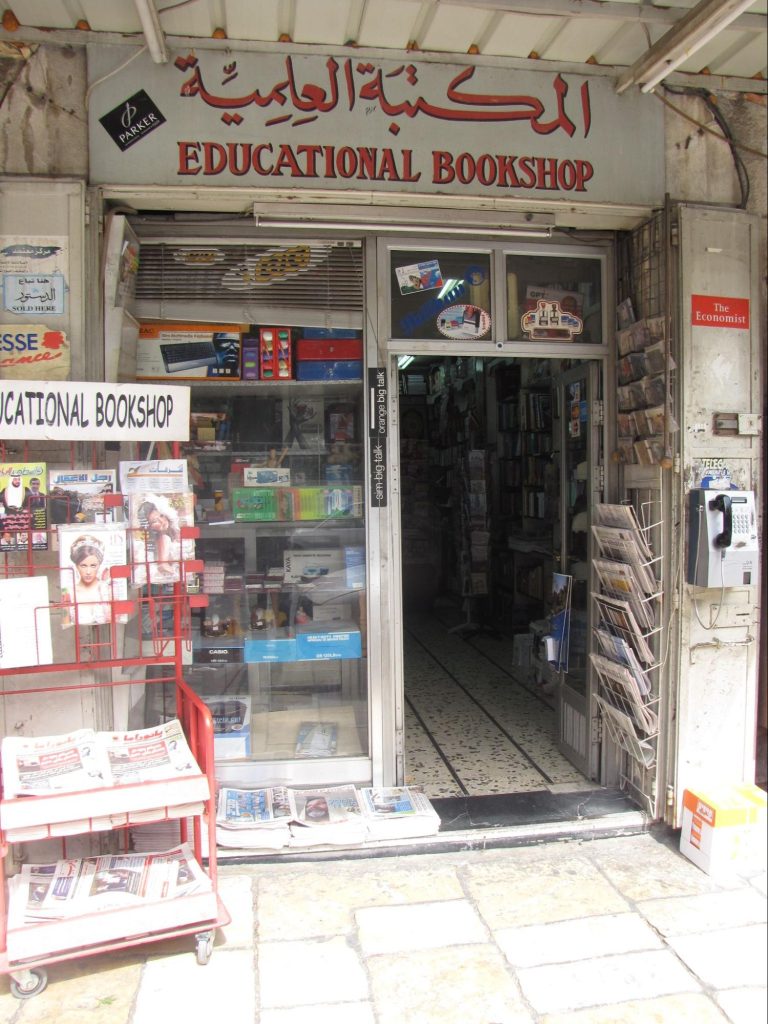For more than 40 years, the Palestinian-run Educational Bookshop in occupied East Jerusalem has provided both locals and tourists with access to a wealth of books, magazines and cultural events, establishing itself as a cultural hub within the historic city. Now, its very existence is under threat.
On 9 February 2025, undercover Israeli police stormed the bookshop and its Arabic-language counterpart next door.
“It was a Sunday afternoon. I was having a good time with my daughter who’s 10 years old,” Mahmoud Muna, co-owner of the bookshop, told Index on Censorship.
The officers started pulling books from the shelves and examining the covers.
“Any cover that had a flag, map, words, keywords like ‘Palestine’, ‘Nakba’ or ‘Gaza’ was deemed suspicious,” said Mahmoud. “Then they Google translate[d] the cover or the blurb or the back page, and they start[ed] creating two piles on the floor, one for the books that they didn’t want to take and another pile for the books that they wanted to take. [This was] completely irrespective of the books and what they mean to us.”
The police put around 300 confiscated books into bin bags, then took Muna and his nephew Ahmad Muna into custody on charges that their books were causing “public disorder”.
“They took us to the police station where we were detained the first night and then taken to court the second night… we were released after 48 hours, myself and my nephew, who was manning the Arabic branch. [We were put] on bail: five days’ house arrest and 20 days away from the bookshop.”
Most of the confiscated books were returned. On 11 March 2025, the police raided the bookshop again, taking 50 books and arresting Mahmoud’s 61-year-old brother and co-owner, Imad Muna. Imad was released a few hours later. The police confiscated books by Banksy, Ilan Pappé and Noam Chomsky, among others.
“They came again and they replayed the whole scenario again. It was just that we were a bit more ready legally. It happened during the morning hours and it was my brother who was in the shop. So we were able to act very quickly and [he was released] before the night,” Mahmoud said.
The Educational Bookshop was founded in 1984 by Mahmoud’s father, Ahmad Muna, a Jerusalem-born teacher. The bookshop has remained a family business ever since.
“For 40 years, we’ve been in operation, trying to serve our community, trying to contribute to social, political, cultural change in a city that is torn between political upheavals. And we believe that books and conversation around books can be an important carrier, if you like, for the conversation. It can open up a space for conversation,” Mahmoud said.

Photo by Mahmoud Muna
These raids are not isolated incidents; they form part of a wider campaign by the Israeli government to crack down on free expression, which has been intensified by the emergence of the far-right within Prime Minister Benjamin Netanyahu’s government and worsened still by Hamas’s incursion on 7 October 2023 and the war in Gaza that has followed.
Recently, authorities have also begun censoring Israeli films critical of the government, as well as events and festivals that discuss Gaza, Palestinians or the 1948 Nakba. The government has started using a revived British Mandate-era law from 1917, which allows the Culture and Sport Ministry to review films before they are screened.
“I think the political climate has really changed. Maybe the war is part of that, but it is not the reason. There is a policy of oppression towards cultural institutions. If you look at theatre, music schools, youth clubs, women’s associations for the last five, six, seven years even before the war, they have been suffering,” Mahmoud said.
Mahmoud says that he and his family have no intention of giving into the authorities’ intimidation tactics.
“We are determined, we’re not gonna give up. It makes me angry, but it also makes me believe even stronger in the power of books and words and literature. And it also opens my eyes even further to the importance of our work in our society.”
Above all, he calls on the international community to speak out against the erosion of democratic values unfolding in Israel and Palestine today.
“If we really believe in what we say, and we really want progressive liberal societies and freedom of expression in Turkey or China or Russia, then we also need to demand them in places like Jerusalem as well.”





